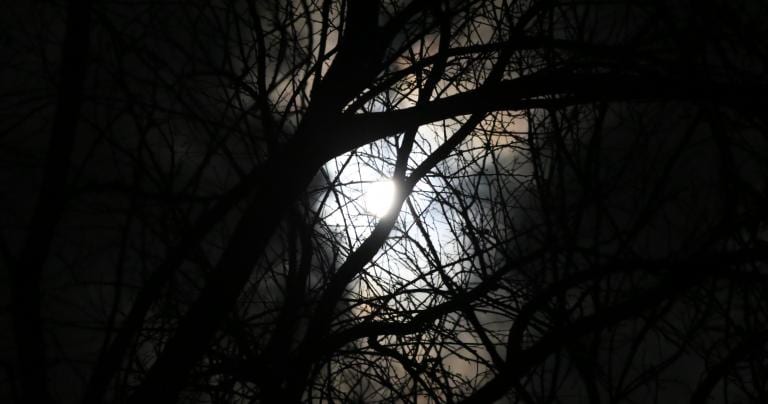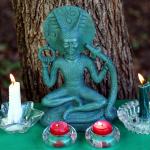From the website SciTechDaily, here’s an article titled Life-Hack: Research Shows Rituals Spell Anxiety Relief. It discusses the research of Dimitris Xygalatas, Assistant Professor of Anthropology at the University of Connecticut, which show that performing religious rituals helps reduce anxiety in stressful situations. The article quotes Xygalatas:
If you were a completely rational being … you would expect that given the current situation [Covid-19] people wouldn’t bother doing things that do not seem crucial to their survival. Maybe they wouldn’t care so much about art, sports, or ritual, and they would focus on other things.
If you were to think that, it would show you didn’t know much about human nature, because humans care deeply about those things.
And the important conclusion:
Rituals play an important role in people’s lives, helping them cope with anxiety and functioning as mechanisms of resilience.
None of this comes as any surprise to those of us with a spiritual practice. As I keep saying, I don’t know how I could get through this pandemic without my regular spiritual practice. My prayers, offerings, and other ritual work keeps me connected to my Gods, ancestors, and other spiritual allies. It reminds me of who I am, who I want to be, and what’s most important.
But while it doesn’t tell us anything we don’t already know, both what it says and what it doesn’t say are worth examining.
The research shows ritual works
Here’s a link to the paper titled The role of ritual behaviour in anxiety reduction: an investigation of Marathi religious practices in Mauritius. Unlike so much research, it’s not locked behind a paywall.
As good research does, it begins with a survey of previous work on this subject. In particular, it references studies that show that in stressful times, people turn to religious and magical rituals. Again, we know this, and those of us who work in these fields have reported more people looking for more magic. It’s Tower Time – what did you expect?
But the earlier research showed what people do – it didn’t show how well it worked. This new study does. I didn’t dive into the statistics but here’s their conclusion:
These results suggest that habitual religious rituals may indeed play a causal role in anxiety reduction, albeit the mechanisms by which such effects are attained need further investigation.
I think it’s important to point out that the rituals didn’t remove stress, they reduced stress. And that’s consistent with our experience (or at least, with mine) that magic doesn’t make things happen, it makes it more likely that they will happen. Maybe it can’t end Covid-19, but it can increase our ability to cope with Covid-19.
I don’t need scientific studies to tell me that ritual works, but it’s nice when serious research confirms what we anecdotally know to be true.
“Life hack” or basic human skills?
But I’m not happy with calling this a “life hack.” And I can’t blame it on click-bait bloggers – this comes straight from Professor Xygalatas.
We have all of these hacks that we can use on our very brain. We could rationalize it and tell ourselves ‘OK, I’m going to lower my heartbeat now.’ Well, that doesn’t work. Ritual is one of those mental technologies that we can use to trick ourselves into doing that. That is what these rituals do — they act like life hacks for us.
Hacking is using technology in a way that’s not only unintended, but also improper. Some hacking is illegal, while other hacking is just bending the rules. But humans have been doing ritual for at least as long as we’ve been human.
If ritual seems like a hack it’s because we’ve forgotten some very basic human skills. And that’s likely because of the next point.
Completely materialist assumptions
The study shows that ritual works – it helps reduce anxiety in stressful situations. But it doesn’t show how it works. Professor Xygalatas correctly points out the need for further research.
Of course it is a combination of factors, and that is why ritual is so powerful: because it combines a number of mechanisms that have to do both with the behavior itself, the physical movements, and with the cultural context, the symbolism, and the expectations that go into that behavior.
To be able to disentangle those things is what we are trying to do next: we are examining these factors one at a time.
I’m sure those things have an impact. But how about the ritual works because it does what it’s intended to do?! Perhaps praying to a deity, making offerings to the deity (not just “to their statues”), and performing sacred motions gets the attention of said deity and persuades Them to assist the worshipper.
You know, like people have been doing for tens of thousands of years???
I understand that it would be very difficult to isolate the actions of a deity from the actions of the worshipper. Even Dr. Dean Radin – who studies magic scientifically – hasn’t been able to do that. While his excellent book Real Magic mentions various spiritual beings, he can’t distinguish their activity. Dr. Radin says:
My hesitation doesn’t mean that such entities don’t exist. It just means that we don’t have methods yet that can strictly discriminate between psi effects in the living and independent, disembodied intelligences.
I don’t expect a solution to this problem any time soon. But it is short-sighted to assume that only psychological factors are involved. If there are forces that cannot be measured, the solution is not to assume they don’t exist. The solution is to name them as a possible factor and point out the difficulty of validating them using materialist methods.
A question of worldview
The problem here isn’t science. The problem is scientists (in this case, social scientists) who assume that Gods and spirits could not have played a part in this because there are no Gods or spirits.
For those of us for whom the Gods are not just real but most real, we have no such conflicts. We gladly accept the findings of science and when science proves us wrong, we change our beliefs. We go where the evidence leads.
But when the evidence is ignored because it doesn’t fit the materialist assumptions of some scientists, we move forward anyway.
When we form and maintain relationships with our Gods, ancestors, and other spiritual allies, they’re usually there for us when times get bad. Sometimes they intercede on our behalf. Sometimes they open the way. Other times they just let us know we’re not in this alone.
The Morrigan has never patted me on the head and told me everything would be OK. But knowing I’m on the side of the Battle Raven?
That does wonders for my anxiety.


















